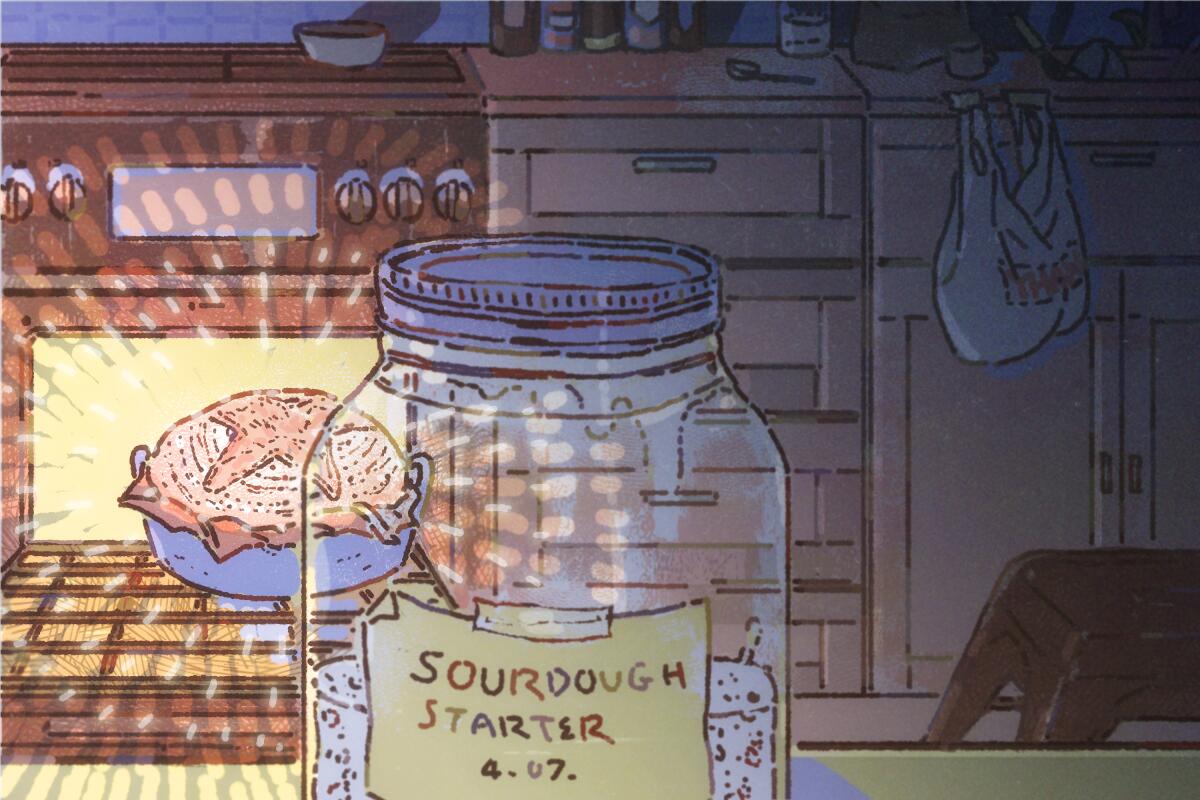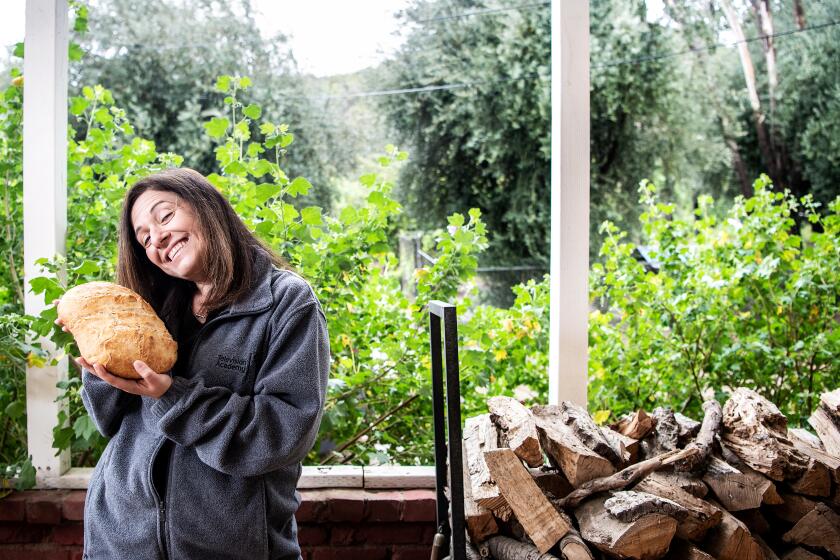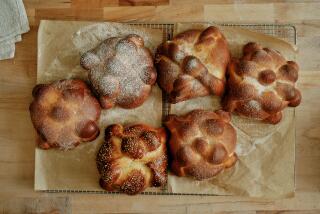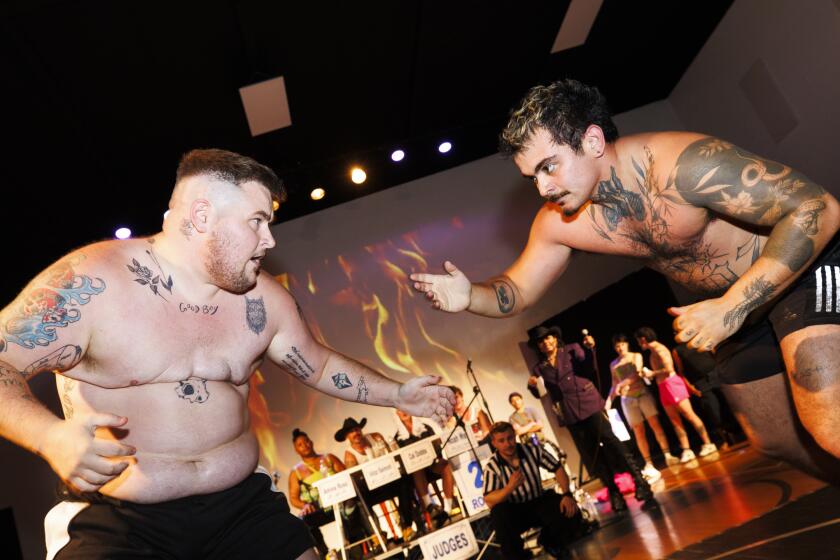In these trying times, my sourdough starter is a mundane miracle

While people are keeping busy with do-it-yourself projects, home-schooling and virtual happy hours, it appears I have unwittingly joined a cult.
The sometimes seedy (and other times dusted with flour) subculture of sourdough baking has welcomed me into its warm, glutenous embrace.
It began innocently enough, fueled by coronavirus-induced anxiety, extra time and a quest for hope. I found myself enamored with the idea of creating something positive and enduring in a period of darkness and uncertainty. Shakespeare wrote “King Lear” while quarantined during the plague; perhaps a sourdough starter could be my magnum opus (with a happier ending).
Sourdough, a crusty bread with a tangy, chewy bite, has been around since eating was invented. It is the stuff of legend and has fed pharaohs and carbo-loading queens, hungry pioneers and gold miners, and tourists in San Francisco spooning clam chowder out of bread bowls.
A starter, or “mother,” the bread’s key ingredient, replaces active yeast with wild yeast derived from the cultivation, fermentation and maintenance of lactobacillus bacteria within a humble mixture of flour and water. The process of creating this life-giving ingredient is as simple as it is profound.
A baking boom is driving thousands of homebound Americans into their kitchens to knead dough and bake cookies as a way to cope with life under quarantine. Watch it play out on social media, particularly #baking Instagram.
A brief internet search revealed straightforward directions for creating a sourdough starter on the Kitchn website written by Emma Christensen. She actually used the words “easy-peasy.” I was in.
The process consisted of mixing water and flour, then letting the mixture sit in a warm location (70-75 degrees) for 24 hours.
My starter, whom I named Steve (after a former starter on the San Francisco 49ers), took pride of place on top of an armoire in the living room. Classy with a K, but the spot has a consistent temperature in our charming but drafty vintage home.
For the next five days, I vigorously stirred the mixture every 24 hours, added more water and flour, and watched the bubbling surface as it gave off an increasingly yeasty and sour smell. In Secret Sourdough Starter Society lingo, I was “feeding” my “mother,” a practice aimed at fermenting the bacteria and bringing the wild yeast to life.
The experience of creating a starter is sort of like having kids or adopting a puppy. You don’t really know what you’re getting into, and then almost overnight your conversations and Instagram feed is awash in doting stories and images of every fascinating (to you) stage of development.
I am not alone in over-posting. Casual scrolls through Twitter and Instagram prove the existence of an active online community of #breadnerds and #sourdoughstarter enthusiasts swept up in the quarantine zeitgeist.
Who knew our collective instinct would be to tie on an apron and reach for the flour? Friends, whom I never suspected of harboring starters, shared that they feed theirs every day. Every day? Others assured me weekly, or even less often, would be fine.
For the most diligent among us, I discovered a professional starter-sitting service at the Arlanda airport in Stockholm. Bakers can drop off their starter at RC Chocolat‘s airport location, where it will be fed and kept alive while you travel. Perhaps for a trip to Belgium, home of the sourdough library at the Puratos Center for Bread Flavour.
The library, which you can tour online, is similar to a seed vault and is dedicated to preserving myriad strains of sourdough biodiversity worldwide. It features live samples of sourdough starters from more than 20 countries. To date, more than 1,100 strains of microorganisms have been recorded.
Looking for accomplishment in confinement? You can register your starter (for free) along with details of its conception, defining characteristics and photo in the website’s online collection alongside entries such as Darth Sourness, a 2-year-old starter from New Zealand, as well as Yeasty Beasty Methuselah, a 50-year-old starter, and That’s a Some Starter, a 103-year-old starter, both from the United States. I’m warning you, it’s a rabbit hole.
Steve’s not quite ready to join the registry ranks of Glutenous Maximus, Albus, Bowie or Clint Yeastwood just yet. We’re still getting to know each other.
Ready, set, reframe: Instead of stressing out about coronavirus and the shutdown, let’s use this time of social isolation to prioritize self-care and mental wellness.
Just last night we had our first fight. He was pushing boundaries, a gloppy mixture overflowing all over the counter. I was left to clean up the mess.
But we’re going to be OK. We’re in it for the long haul. Using the recipes and FaceTime guidance of friend and home baker extraordinaire Chip McCarthy (no relation, to his great relief), I’ve moved into the next phase: actual baking. It’s been a rocky start with several failed attempts and less-than-lovely loaves, but my latest effort showed promise.
I have so much to learn. But I also have time and the blessings of flour, water and salt. So in a warm kitchen, separated from the world but united in a spirit of solidarity, my journey begins as I bake, experiment, seek purpose and find comfort in the mundane as well as the miraculous.
In isolation I practice hope, watch for goodness to bubble to the top and know that I am not alone in doing so. Together, we rise.
More to Read
Sign up for The Wild
We’ll help you find the best places to hike, bike and run, as well as the perfect silent spots for meditation and yoga.
You may occasionally receive promotional content from the Los Angeles Times.











